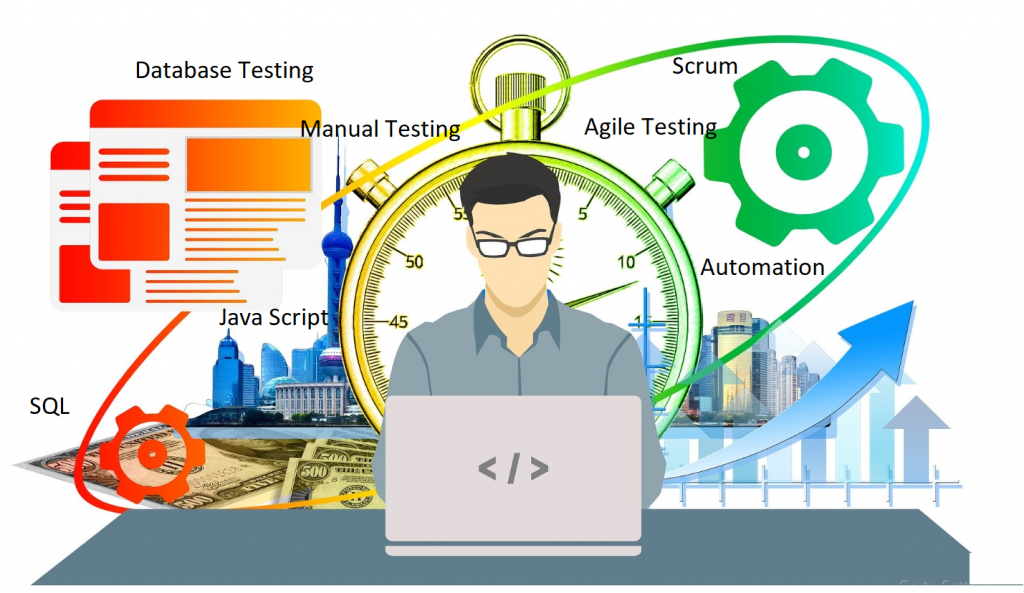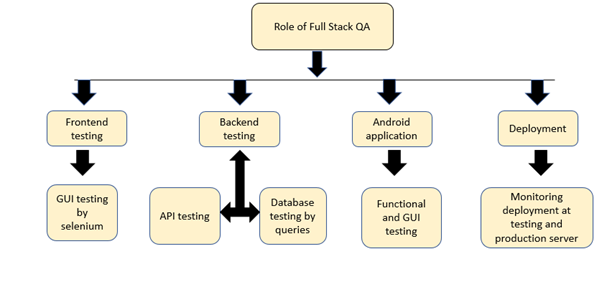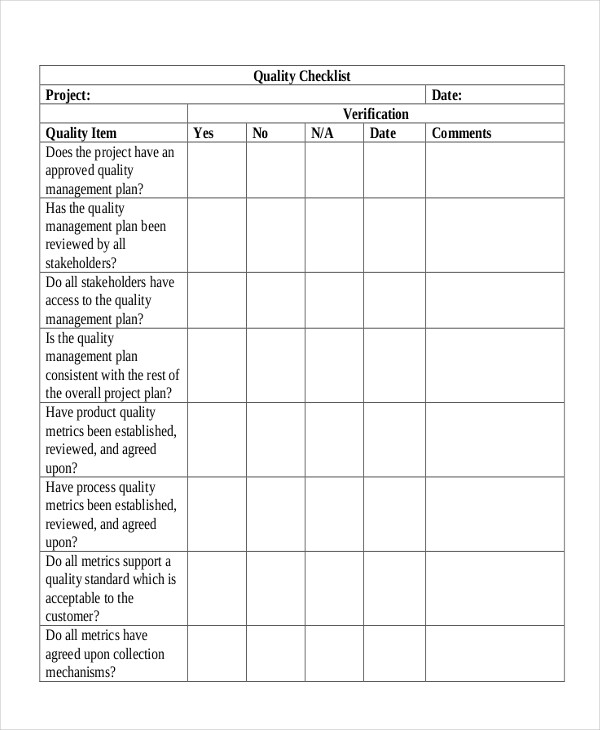
Full Stack QA Engineering team in Software
Why is full-stack QA essential in software development?
There is a belief that QA engineers are much less professional than developers, mainly involved in manual testing of whatever happens to be handed over to them by the developer. This myth paints testers as mainly reactive, checking for flaws in the work that developers have done, rather than proactively searching for defects during the planning, design and implementation processes. When we were doing most of our waterfall-style development, there might have been some truth in this, but in today's agile and DevOps organization, this is an outdated and inaccurate view. You are pretty much sure to work with full-stack QA engineers in today's organization. Let me explain.

A developer who masters each layer of an application, and the technologies employed all the way through from the back-end to the front-end, is called a full-stack developer. Similarly, a QA engineer working on all aspects of quality and using different testing methods to test their application, is called a full-stack QA engineer. A full-stack QA engineer will be comfortable working across all of the application’s layers, and will be familiar with large parts of its functionality. They will think about the many different aspects of product quality, such as functionality, usability, performance, security, globalization and so on. They will be familiar with test automation strategies and technologies. The full-stack QA engineer has a rich mix of domain knowledge, technical skills and testing expertise, all from a user-oriented perspective.In today's world where agile technology is used, testing cannot be done at the time of release, it should be done at every sprint, so full-stack QA work starts from gathering requirements, understanding the functionality of the application, works closely with the development team advising them to build the application as per the user perspective and after it testing the application with user perspective using testing expertise and tools. It results in a more tested product with fewer bugs and faster delivery of the product. They should have knowledge of automation strategies and testing expertise.
Key-qualities of Full Stack QA:
- Should have knowledge of agile methodology and terms used in it.
- Should have strong manual testing knowledge.
- Basic knowledge of programming language used in the project.
- API and database knowledge.
- Dev-ops knowledge is a plus.
Scope for 2021
Based on the research done on some job portals, we can safely make the following conclusion in terms of demand for a full-stack QA engineer. Worldwide, there is decent demand for full-stack QA engineers especially in continents like Europe and North America. Full-stack QA engineers also have good growth opportunities as Test Architects in the future because of their experience in almost all the parts of the software testing process.
Role of Full Stack QA in Pigeon (Logistics Platform)
The primary motivation for full-stack QA is the adoption of agile product development processes. As software updates are delivered more frequently, QA engineers have less time to complete all the testing. There's not much time towards the end of a sprint, and it’s certainly too late to do it months after the feature’s development is ‘complete’ (can it really be complete if you’ve not finished testing?!) We at Encoding Enhancers have developed a cloud-based logistics, supply chain and warehouse application where we can access complete information right from the creation of order to delivery of the orders. Full stack QA roles involved testing at various levels which are as follows-
- It starts from proper gathering of requirements after meetings with clients and documented them on GitLab.
- Understanding the algorithms used by dev team and monitoring the implementation.
- Assisting dev team for unit testing of the application.
- Writing test cases for the web and android application.
- Testing the branches made at frontend to test the GUI.
- API testing by using postman tool.
- Testing the database for change in records.
- Testing of merged code on testing server.
- Testing of mobile apk used for delivery of loads.
- Re-Testing and regression testing for the fixes done at web and android application.
- Monitoring deployment by dev-ops team on preprod server.
- Sanity Testing at preproduction server.
- Monitoring final deployment on production server.
Checklist of things you need to know to build a full stack application:
- Learn how to Authenticate
- Build Roles, Permissions and Access Control
- Learn how to CRUD
- Learn how to REST
- Learn to work with forms and state
- Build an API
- Build Notifications for Email, SMS and other realtime Webhooks
- Build Subscriptions and Plans
- Learn billing integration with payment gateways
- Handle File uploads
- Don’t be afraid to work with third party APIs, Frameworks and Packages
- Work with, build and extend community packages
- Create an admin interface
- Manage Caching
- Think in terms of components
- Work with a modern version control system for your code
- Work with the command line
- Ask good questions on Stack Overflow

Typical skills/responsibilities of a Full Stack QA Engineer
Following are some skills (but not limited to) required to be a full-stack QA engineer (these skills are some common skills collected from job requirements posted on major job portals such as LinkedIn and Glassdoor):
- Strong knowledge of Agile methodology, software QA methodologies, tools, and processes.
- Ability to write test scenarios and test cases for manual testing.
- Ability to write unit and integration tests.
- Understanding of testing frameworks.
- Writing automation test cases on tools like Selenium Webdriver.
- Experience in API automation such as Postman.
- Experience with Continuous Integration and Continuous Delivery tool such as Jenkins.
- Experience in Bug tracking and reporting.
Advantages

- The benefit of continuous learning – in this job role, a person has a chance to learn multiple technologies or tools. As explained earlier, a full-stack QA engineer will be responsible for both manual and automation testing. If you look at the skills mentioned in the above section, you can understand what type of knowledge a full-stack QA engineer is required to have. For such a wide range of skills, you need to keep learning new skills available in the market at regular intervals and keep yourself updated.
- Good salary – Due to the multiple skills requirements from a single resource, companies will be ready to pay more money for a good candidate. Hence, full-stack QAs are better-paid specialist QA or Test Automation Engineers.
Disadvantages
- Too much pressure on one person to do everything – Full-stack QA engineer can enjoy multiple benefits working at such a significant position but at the same time, it comes with a great workload. Working in an agile team with the pressure of continuous learning along with the use of existing knowledge efficiently may create an extra layer of overstretching.
- If a certain tool is not in demand, it might take time to learn a similar new tool – As mentioned earlier, a full-stack QA engineer needs to be aware of the new market developments and keep himself ready to learn new tool or technology as early as possible to make the best use of the new method in the existing project. With the great workload coming with the position, it might get difficult for the person to manage everything on hand.
Conclusion
For any individual interested in ‘software testing’ as a career, having expertise in all areas of testing will be beneficial not only for the candidate but also for the hiring company. This role can be seen as a very significant role in any organization and it will also help to boost career growth. So a full-stack QA works start from the planning phase and end on deployment (and maintenance).In agile methodology, testing comes in parallel so full-stack QA plays a crucial role in delivering a quality product as testing strategies are involved in each and every phase of software development. We hope this article was helpful for people who are looking for a change in their testing career and also for people who are planning to start their career in software testing.
Keep learning
- Get up to speed on using AI with test automation in TechBeacon's Guide.
- Find out the top four benefits of AI-powered testing in this Webinar.
- Learn best practices for reducing software defects with TechBeacon's Guide.
- Download the free report "Agile and DevOps Reduces Volume, Cost, and Impact of Production Defects".
- Practice quality-driven development with best practices from QA practitioners in TechBeacon's Guide.
- Download the free World Quality Report 2019-20.